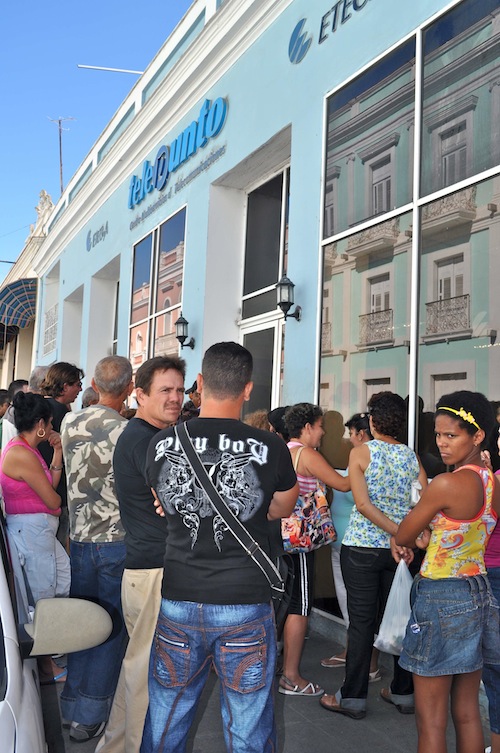
It was my third day of attempting to send an email. I had scrapped my original plans of keeping a daily blog, realizing that I would spend so long trying to get online that I would probably have nothing to write about anyway. All I wanted now was to tell my family that I hadn't passed out on a Cuban pavement in a rum stupor (that would probably be their first suspicion, before thinking I was in any type of trouble.)
The first day, I asked at Hotel Telegrafo. I thought the name was a good omen for communication with the outside world. Clearly not.
"We've run out," the receptionist said.
I thought I had misunderstood her Spanish.
"Run out?"
"Yes, run out. Try tomorrow morning."
She gave me an exasperated sniff, and went back to work.
I didn't know it was possible to run out of internet. I have limited technological nous, but I was pretty sure that the World Wide Web was not turned on or off like a tap.
Again I was mistaken. We were in the midst of what you could call an internet drought, though people in Cuba call it everyday life.
When I returned the following lunchtime, and again they had run out, I quizzed her. What I understand -- correct me if I'm wrong -- is that each day the hotels are only given a certain allocation of internet codes -- like they do in internet cafes -- with which guests can log on to the web. When they run out, they can't give out any more until the next day. All three hotels in the area were in the same predicament.
I wasn't particularly enamoured with the idea of sitting in a stuffy lobby anyway, so I resolved to try later and went off exploring. But when on the third day, I was told, that although they had enough codes, it wasn't working, I realised I needed another tactic.
"No connection today," another receptionist told me.
"How about if I try later?"
She shook her head with a grimace.
Finally, a little bit late I suppose, I learnt about telepuntos; shops in which you can use the internet, make long distance calls or top up your mobile. State-run telecommunications company Etesca has the monopoly over all internet access in the country, and there are telepuntos in most big cities, though your chances of finding internet elsewhere is limited.
I headed to Calle Obsipo, and I knew I was approaching by the furor outside. Multiple lines tangled together in an incomprehensible scrabble of a system. I called, "El ultimo?" to find out who was last in the queue -- standard queuing practice in Cuba -- and took my place in the shuffle. There appeared to be no due process. Occasionally someone would break formation and talk closely with the security guard, but I hadn't yet seen anyone allowed through the hallowed gates.

After 30 minutes, a kind lady tapped me on the shoulder, and indicated I should go talk to the guard. I approached tentatively, unsure of the ettiquette here, and explained I needed the internet. He waved me straight in barely listening to me.
In the air-conditioned sanctuary of the telepunto, I felt like a cheat, a queue scoundrel, a deserter. I looked out the window at my former queue companions, and they were utterly unperturbed. I realized I had never been in the same line as them anyway.
It seemed apt that this porthole to the outside world was one of the few places in Cuba that had a chilly calm air of exclusivity, like a first-class departure lounge.
I asked for the internet, and the receptionist gave me what looked like a scratch card for CUC 6 (roughly $6). I had to provide my passport and sign. Cubans aren't allowed to use the internet without a government-issued license, so the telepuntos always ask for ID. Licenses are granted to students, researchers or anyone who can justify it for their line of work, but even then, access it is severely restricted and monitored. According to official Cuban statistics, in 2011 only 3% of the population had access to the web, the lowest figure in the western hemisphere. The isolation of Cuba exists in the virtual world as much as the real. Despite the proliferation of opinion about Cuba, Cubans themselves are woefully under-represented on the web in blogs or comments, at least Cubans still living in the country.
Logging on, it took about 10 minutes to load my Gmail. That made it an incredible $1 per page. In some hotels they charge up to $12, which has to be a contender for the most expensive -- and slowest -- internet service in the world. Surfing the Cuban web was akin to using the internet in the '90s. I sent the one mandatory "I'm alive!" email, before frustration levels were insurmountable. There were far better things to do with my time than stare at the screen. I do enough of that in London.
Later on I met a young Cuban, who told me about his illegal (unlicensed) casa for $15 a night -- half the usual price -- and boasted of his hijacked internet connection. This has become quite common. The lack of access has led to an enormous black market in illegal internet, so it is almost impossible to estimate actual internet usage. But it testifies to the truth that no matter what barriers -- real or virtual -- are erected in their path, people will always find a way to reach out to others.